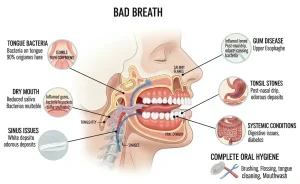Overview
Diagnosis of Bad Breath (Halitosis)
Diagnosing halitosis involves a combination of clinical examination and specialized tests:
-
Oral examination: The dentist evaluates the mouth, teeth, gums, and tongue. The back of the tongue is often scraped to detect bacterial activity that produces odor.
-
Odor assessment: Dentists may smell exhaled air from the mouth and nose and rate the intensity on a standardized scale.
-
Chemical detection: Some dental clinics use devices that measure volatile sulfur compounds (VSCs), which are the main chemicals responsible for oral malodor.
-
Dental and medical history review: A detailed history helps identify risk factors such as poor oral hygiene, periodontal disease, dry mouth, or other medical conditions contributing to halitosis.
-
Additional tests: In cases where oral causes are not evident, referral to a primary care physician or ENT specialist may be recommended for evaluation of systemic conditions such as sinus infections, gastrointestinal disorders, or metabolic diseases.
Treatment of Bad Breath (Halitosis)
Treatment focuses on eliminating bacterial sources, managing oral disease, and addressing underlying medical conditions:
-
Oral hygiene management: Brushing teeth twice daily, flossing, and using a tongue scraper reduce bacterial accumulation on teeth and tongue.
-
Antimicrobial mouth rinses and toothpastes: Products containing agents such as chlorhexidine, cetylpyridinium chloride, or essential oils can reduce oral bacteria responsible for halitosis.
-
Periodontal treatment: For patients with gum disease, scaling and root planing or referral to a periodontist may be necessary to remove bacterial biofilm and reduce odor-causing pockets.
-
Correction of dental restorations: Replacing faulty fillings, crowns, or bridges removes trapped food and bacteria that contribute to bad breath.
-
Management of systemic causes: When halitosis is linked to medical conditions, treatment may include managing respiratory infections, gastrointestinal issues, or metabolic disorders under physician supervision.
-
Lifestyle measures: Maintaining hydration, avoiding tobacco, and regular dental visits help prevent recurrence.
With proper diagnosis and treatment, most cases of halitosis can be effectively managed, restoring oral health and reducing persistent bad breath.
Advertisement

